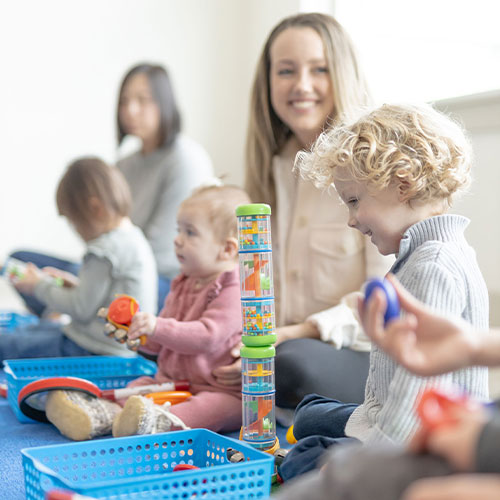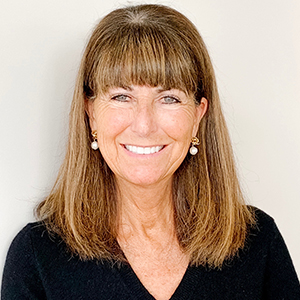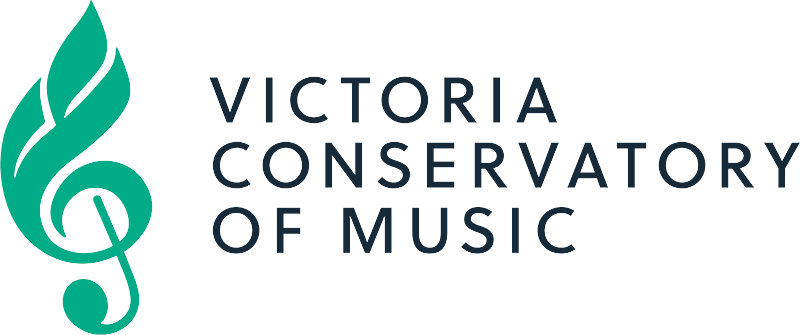Early Childhood Music
Our programs for young children are based on a child’s natural instinct to communicate through sound and movement, and from there we help them discover all the wonders of music.
About
Providing a child with a foundation in music is one of the most valuable things a parent can do. Studies show that when children take part in music classes, their social and cognitive skills are impacted in extremely positive ways. Music facilitates learning, instills respect and pride, and increases self-esteem and positive social interaction. Discover our wonderfully creative and innovative collection of music classes that will be the start of your child’s lifelong journey with music.
Consider signing up for the full year! Our children’s programs are, in most cases, designed around a year-long curriculum that works towards building your child’s understanding of music.
Early Childhood Music programming is intended for infants, toddlers, and preschool-age children. We offer:

- A variety of term-based Group Classes for children under 5 years of age, held at both of our locations.
- In-Community flexible programs tailored to the needs of daycares, preschools, or recreation centres. Email Dr. Johanne Brodeur, Early Childhood Music Department Head for more information on how to book.
- Musical Birthday Parties are offered for children up to six years old. One of our Early Childhood Music specialists will be pleased to provide a 45-minute party!
“There is absolutely no doubt in my mind that the Victoria Conservatory of Music is your #1 choice for music education for children of all ages and abilities. Please come and celebrate the positive power of music in children’s lives and let us inspire and enrich the lives of your children.”
Dr. Johanne Brodeur, Early Childhood Music Department Head
Faculty

Dr. Johanne Brodeur
Department Head

Dylan Marks

Raina Saunders

Annika Sauser
Frequently Asked Questions
When should my child begin taking music lessons?
The earlier the better! The youngest student the Conservatory ever had was in a “Families Making Music” group music class at only 17 days old!
Music education for very young children – from babies to three years old – starts in group settings. Come and learn rhymes and lullabies, try different instruments, play musical games with your little ones, and meet other moms and dads.
By age three or four, children may continue in groups, but this is also the time to start thinking about introducing specific instruments such as the piano or violin. For an early start, we offer beginner violin and piano classes in small groups or individual lessons. In general, children would start individual lessons at around 6 or 7 years old.
Can I participate with my child?
A parent/caregiver is requested to attend group music classes with their very young child. Once the child is a bit older, parents usually no longer need to attend.
Do you offer trial classes?
We do not usually offer sample classes. However, with the instructor’s approval a parent/caregiver may be able to join for one class with their child and meet the instructor. Instructor approval will depend on a few factors, including there being an available spot in the class, and the feasibility within the group given the time of year and how the class has been structured.
Who designed the activity program my child will be doing?
Our classes are uniquely designed by their instructor for the participants, and do not involve adopting any preset third-party curriculum or methods. This allows the instructor to adapt each classes, be it from one term to the next, or even on a particular day. For example, if the children are very active that day, it is easy for a seasoned instructor to adapt the class according to the level of energy in the room, rather than simply follow an established class outline from one week to the next.
My child is shy, is a group class activity the right choice?
Our classes are designed to include a parent/caregiver attending with their child at first, and eventually moving to where the child attends on their own. The gentle but necessary transition to participating in a group environment without a parent/caregiver present helps encourage the social development that will lead to the child feeling comfortable in their first school classroom setting. Participating in a group environment is typically more desirable than one-on-one instruction at an early age.
My child never sits still and loves running around; can they attend your classes?
Absolutely! There are many ways the instructor may adapt class activities in order to include your child’s energy, but the instructor will also encourage them to sit and participate in some of the wonderful music activities that include exploring the wide variety of instruments we offer.
How do you keep young children focused for 30 or 45 minutes?
Our instructors design their classes with very young children in mind, and include many activities during the class period. After a hello song and perhaps a rhyme, children are invited to play musical games and play instruments. Instructors alternate active and quieter activities almost every five minutes in order to keep the young children focused and interested.
What instruments do you provide?
The instruments we use are of high professional quality and provide children the opportunity to explore a large variety of small and larger melodic (pitched) and non-melodic (non-pitched) percussion instruments. There are literally hundreds of instruments in our studios.
What are the main advantages to having my child attend classes at the Conservatory?
Music has a crucial impact on every child’s development. The classes are designed to bring an enormous amount of joy to the child’s life but also to increase skills such as:
- Language development (through songs and world music).
- Social skills (eg: taking turns / respect / cooperation / team building).
- Math awareness skills (counting beats and rhythmic awareness).
- Motor skills (Gross motor through dancing and movement and Fine motor through instrument playing).
- Auditory and visual perception skills (discrimination, tracking, memory and sequencing).
Notice: All Early Childhood Music classes do not require approval by the Private Training Institutions Branch of the Ministry of Advanced Education, Skills & Training and as such has not been reviewed.
